Topic: Political Rant
The end has almost come. Assuming that everything goes according to plan, I will board a plane tomorrow and Iraq for good. This will probably be my second to last entry on this blog.
There were many things that I chose not to write about in this blog. There have been wild parties that makes most of the parties that happen back in the States seem lame. I have watched some of my friends slowly creep toward personal collapses, and I know people who suffered near complete breakdowns. I have witnessed the behavior of senior leaders in the reconstruction and felt totally appalled. I have watched people do stupid things, such as throwing rounds into a fire, and simply shrugged it off. I have listened to Iraqis tell the stories of a country tearing itself apart and stood powerless before them with nothing to help ease their pains or keep them safe. I have seen some of the best and brightest people I have even known work tirelessly to help the Iraqi people. I have also seen Iraqis doing everything they can to survive this war, protect their families, and help their country.
I have many stories to tell, yet there is one thing that bothers me more than anything else. I have watched the reconstruction fail right in front of my face. The history and the future of the multi-billion dollar investment in Iraq's future failed to deliver on many of the important promises made to the Iraq people, and the reconstruction was probably the easiest component of the American misadventure in Iraq.
In late November 2005, the Bush Administration stated in its National Strategy for Victory in Iraq that our "strategy is working," which stands in sharp contrast to my assessment. The Administration stresses that "much has been accomplished in Iraq, including the removal of Saddam's tyranny, negotiation of an interim constitution, restoration of full sovereignty, holding of free national elections, formation of an elected government, drafting of a permanent constitution, ratification of that constitution, introduction of a sound currency, gradual restoration of Iraq's neglected infrastructure, and the ongoing training and equipping of Iraq's security forces."
No matter how pessimistic I have become, the Bush Administration is correct that positive things have happened, but the details behind these positive statements make the "successes" seem far murkier and very questionable. Perhaps more importantly, the details make the prospect of helping "the Iraqi people build a new Iraq with a constitutional, representative government that respects civil rights and has security forces sufficient to maintain domestic order and keep Iraq from becoming a safe haven for terrorists" seem long and at times even unlikely.
 Security. Almost every time that a dictatorship falls, a period of anarchy ensures. It happened in East Timor. It happened in the Congo. It happened in Iraq. Unfortunately, the military (or perhaps just senior Administration leaders) failed to plan for this highly enviable outcome. In fact, senior political leaders pushed people out of the way who questioned the plan or made comments that attacked the logical behind the basic plan.
Security. Almost every time that a dictatorship falls, a period of anarchy ensures. It happened in East Timor. It happened in the Congo. It happened in Iraq. Unfortunately, the military (or perhaps just senior Administration leaders) failed to plan for this highly enviable outcome. In fact, senior political leaders pushed people out of the way who questioned the plan or made comments that attacked the logical behind the basic plan.To make matters worse, as the Guardian wisely noted in December 2005, "the US occupation has made at least one major political mistake every year. Big Blunder 2003 was the dissolution of the Iraqi army. Big Blunder 2004 was the failure to dismantle militias - out of fear of upsetting the Kurds and the main Shia religious party, the Supreme Council for the Islamic Revolution in Iraq (Sciri)." These failures added fuel to a dangerous, violent fire - the insurgency - sweeping through the country.
Military might alone cannot bring these forces back under control. These difficulties in the security arena have made the US turns its attention, and much of its hopes, toward bringing the divergent forces into the political process and giving people the belief that avoiding violence and supporting the reconstruction will bring them some tiny bit of hope.
The Reconstruction. The reconstruction has failed. It failed for many reasons. It failed because the initial plans for Iraq did not even include any significant reconstruction funds. It failed because the plans for the $18.4 Iraq Relief and Reconstruction Fund (IRRF) were not based on realistic assessments of the work that needed to be done. It failed because completed projects are not sustainable. If they aren't sustainable, everything falls apart the minute the reconstruction teams leave.
The Americans simply could not overcome these basic problems of the reconstruction in face of the massive challenge in front of them - rebuilding a country that endured three massive wars in twenty years, three decades of totalitarian rule, and the punishing effects of economic sanctions.
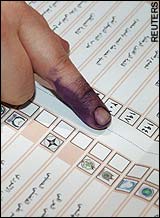 Politics. The typical American view is that the elections are like a magic wand that will produce peace and prosperity. This may be so, but Iraqi elections have yet to produce a viable, trustworthy government. Consider the El Salvador elections in 1982 that went off well in terms of numbers; their civil war there went on for another decade. Will that happen in Iraq? While the political process can bring an end to the violence, it won’t happen overnight even if it goes well.
Politics. The typical American view is that the elections are like a magic wand that will produce peace and prosperity. This may be so, but Iraqi elections have yet to produce a viable, trustworthy government. Consider the El Salvador elections in 1982 that went off well in terms of numbers; their civil war there went on for another decade. Will that happen in Iraq? While the political process can bring an end to the violence, it won’t happen overnight even if it goes well. Perhaps the most disappoint aspect of the political process is how little we know about the fate of this country. It could still slip into a full blown civil war. It could somehow hold itself together. It could become a Shiite religious state tightly aligned with Iraq, which definitely isn't want the Bush Administration would want. I find it disconcerting that pushing three years into this adventure – after all the lives that have been lost – we still don't know what will happen.
I could go on and on about what I think about the American adventure in Iraq, but I need to get to work and my comments are just one take on it. Thus, I think I will leave my comments as a three legged argument. The security situation remains bad. The reconstruction failed. The results of the political process are inconclusive. With the American government now determined to begin the lengthy pull out process, is it too late to fix these three problems to ensure that some good comes out of this war?
Whatever happens now, the fate of Iraq is now in the hands of the Iraqi people.
And in other news . . . I want to wish the best of luck to all my fellow Iraq bloggers out there. Keep blogging.
Posted by alohafromtim
at 11:12 PM EST
Updated: January 1, 2006 11:27 PM EST

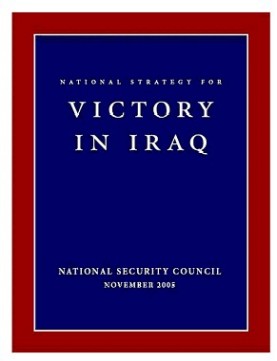 The new, much-heralded
The new, much-heralded 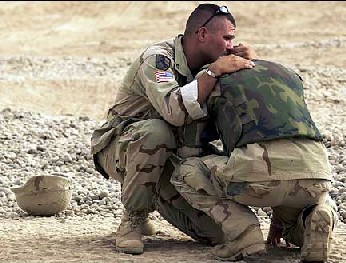 More Troops. Adding more US soldiers troops may improve the security situation in the short-term, but it could also easily backfire. No one wants to see foreign troops on their soil, especially the Iraqis who have dealt with occupation forces since early 2003. Adding more troops could encourage more Iraqis (and other Arabs in the region) to view the insurgency as a battle of liberation against foreign troops. While it may have been a good idea to send more troops in mid-2003, it is no longer a wise idea.
More Troops. Adding more US soldiers troops may improve the security situation in the short-term, but it could also easily backfire. No one wants to see foreign troops on their soil, especially the Iraqis who have dealt with occupation forces since early 2003. Adding more troops could encourage more Iraqis (and other Arabs in the region) to view the insurgency as a battle of liberation against foreign troops. While it may have been a good idea to send more troops in mid-2003, it is no longer a wise idea.  The Reconstruction. The reconstruction is in serious trouble. Two of the major sectors of the reconstruction, water and power, illustrate the many problems facing the American government in Iraq. For a whole host of reasons, Iraqis have
The Reconstruction. The reconstruction is in serious trouble. Two of the major sectors of the reconstruction, water and power, illustrate the many problems facing the American government in Iraq. For a whole host of reasons, Iraqis have  The New Iraqi Government. The new Iraqi government can't generate enough revenue to support itself. With an ongoing guerrilla war raging throughout the heart of the country, the central government can't use income taxes or a sale tax to support its operations - tax collectors need to operate in a stable environment, which isn't going to happen anytime soon in Iraq. The new Iraqi government is trying to finance its operations by selling oil, but that isn't enough to cover the government's annual budget (slightly more than $5 billion). To make matters worse, Iraq
The New Iraqi Government. The new Iraqi government can't generate enough revenue to support itself. With an ongoing guerrilla war raging throughout the heart of the country, the central government can't use income taxes or a sale tax to support its operations - tax collectors need to operate in a stable environment, which isn't going to happen anytime soon in Iraq. The new Iraqi government is trying to finance its operations by selling oil, but that isn't enough to cover the government's annual budget (slightly more than $5 billion). To make matters worse, Iraq 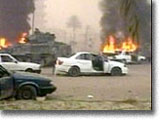 and Saudi Arabia; now Iraq has become one. Of all the justifications for invading Iraq that the administration juggled in the beginning, the only one that has held up over time is the desire to create a democratic nation that could help stabilize the Middle East. Any sensible discussion of what to do next has to begin by acknowledging that. The surest way to make sure that conversation does not happen is for the administration to continue pasting the 'soft on terror' label on those who want to talk about the war."
and Saudi Arabia; now Iraq has become one. Of all the justifications for invading Iraq that the administration juggled in the beginning, the only one that has held up over time is the desire to create a democratic nation that could help stabilize the Middle East. Any sensible discussion of what to do next has to begin by acknowledging that. The surest way to make sure that conversation does not happen is for the administration to continue pasting the 'soft on terror' label on those who want to talk about the war."  While blaming the CPA might be fun, doing so is like chasing after a ghost. No one ever officially created the CPA. It just sort of happened. On May 6, 2003, President Bush appointed
While blaming the CPA might be fun, doing so is like chasing after a ghost. No one ever officially created the CPA. It just sort of happened. On May 6, 2003, President Bush appointed 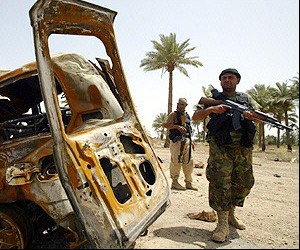 Perhaps this wouldn't be so troubling if the CPA significantly improved the lives of average Iraqis. Unfortunately, despite it's best efforts, it failed. The infrastructure is still
Perhaps this wouldn't be so troubling if the CPA significantly improved the lives of average Iraqis. Unfortunately, despite it's best efforts, it failed. The infrastructure is still  In this type of environment, one of the few internal checks inside the system would be the Inspector General (IG) offices and other auditor hired to make sure the government keeps its nose clean. However, the level of oversight may not be enough to handle the approximately $300 billion that has rushed / is about to rush through Iraq. Here is a short list of the key auditors working in Iraq:
In this type of environment, one of the few internal checks inside the system would be the Inspector General (IG) offices and other auditor hired to make sure the government keeps its nose clean. However, the level of oversight may not be enough to handle the approximately $300 billion that has rushed / is about to rush through Iraq. Here is a short list of the key auditors working in Iraq:  There are many companies that provide security services for government employees in Iraq. Many companies provide "static" security at government compounds inside the International Zone and through the country. These companies also provide personal security detachment (PSD) services, which basically involves rounding up a bunch of mercenaries to help protect government employees when they leave their compounds.
There are many companies that provide security services for government employees in Iraq. Many companies provide "static" security at government compounds inside the International Zone and through the country. These companies also provide personal security detachment (PSD) services, which basically involves rounding up a bunch of mercenaries to help protect government employees when they leave their compounds.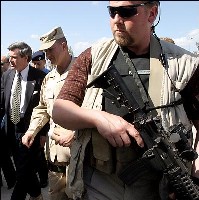 However, they failed to keep adequate documents on file for auditors to determine whether selecting Kroll was in the best interests of the U.S. government or if someone else should have won the contract.
However, they failed to keep adequate documents on file for auditors to determine whether selecting Kroll was in the best interests of the U.S. government or if someone else should have won the contract. Within a few months after the Saddam's government fell, US government officials working at the
Within a few months after the Saddam's government fell, US government officials working at the 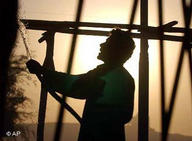 Some development experts in Iraq repeatedly argued for a comprehensive approach that would incorporate rebuilding the human institutions that would support the projects (i.e. sustainability). For example, the Ministry of Electricity needed to learn how to delegate central authority from Baghdad technocrats to plant managers, create a monitoring and billing system to encourage the sensible use of electricity, and institutionalize the use of long-term planning for maintenance, develop personnel policies that reward good performance, prevent Baghdad technocrats from hiring plant manager based on their relationship to key political leaders, etc. For the most part, these institutional strengthening requests were ignored. The budget request submitted by CPA/DoD and eventually approved by Congress did not include any significant sustainability efforts. Thus, the sustainability efforts were limited to low-level operations and maintenance issues, such as providing basic equipment training at newly constructed water treatment plants.
Some development experts in Iraq repeatedly argued for a comprehensive approach that would incorporate rebuilding the human institutions that would support the projects (i.e. sustainability). For example, the Ministry of Electricity needed to learn how to delegate central authority from Baghdad technocrats to plant managers, create a monitoring and billing system to encourage the sensible use of electricity, and institutionalize the use of long-term planning for maintenance, develop personnel policies that reward good performance, prevent Baghdad technocrats from hiring plant manager based on their relationship to key political leaders, etc. For the most part, these institutional strengthening requests were ignored. The budget request submitted by CPA/DoD and eventually approved by Congress did not include any significant sustainability efforts. Thus, the sustainability efforts were limited to low-level operations and maintenance issues, such as providing basic equipment training at newly constructed water treatment plants.